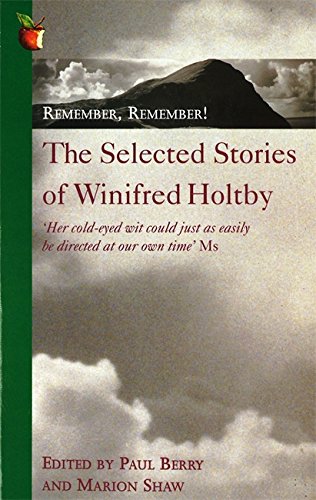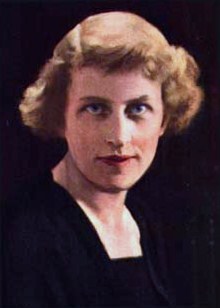
photo crop © Andy Delcambre, 2008
*
In this longlisted essay from the 2016 THRESHOLDS Feature Writing Competition, Sue Wilsea finds contemporary resonance and universal thruths in Winifred Holtby’s Remember, Remember!
~
A Spinning Wheel of Light
by Sue Wilsea
The title of Winifred Holtby’s book of selected stories – Remember, Remember! – can seem a tad desperate and the dreary immemorable cover does nothing to help. It’s a book you could be forgiven for picking up, turning over, and then replacing in the charity shop discount box. Perhaps a saving grace is that it doesn’t feature one of the standard early-1900s pictures of Holtby, because that might well reinforce the idea of the author being a humourless blue-stocking in the same mould as Virginia Woolf. Of course, there are connections between the two, not least that Holtby wrote Woolf’s biography, but the two women could not have been more different. By all accounts, Holtby was cheerful and vivacious, a jolly-hockey-sticks type who loved life and was angry at being forced to leave it as early as she did.
From time to time, when there is a current adaptation of South Riding, Holtby drifts back into the public consciousness. Although her most famous work, which was published posthumously, has been dismissed as a ‘provincial’ novel (literary snobbery being then, as now, deeply ingrained), in fact, its huge cast of diverse characters and its panoramic view of life, seen through the lens of a rural Yorkshire setting, make it a worthy contender for standing as a twentieth century Middlemarch. Perhaps it is Holtby’s uncompromising refusal to give Sarah Burton, her protagonist, a happy-ever-after ending that unsettled critics. Or perhaps it’s that local government is not a sexy subject. Hardly surprising, then, that her five earlier novels and her short fiction have received relatively little attention since her death.
Remember, Remember! comprises short stories written from 1923 to 1937. The editors have followed the author’s idea from an earlier publication by creating six sections: ‘Autobiographical’, ‘Domestic’, ‘Fantasy’, ‘Women’s Lives’ and ‘Abroad’, with a short introduction to each. Although the desire to corral and categorise Holtby’s sprawling output is understandable, this might well prove another obstacle to the reader. Lorrie Moore, in her introduction to The Best American Short Stories 2004, aptly compared a short story to a love affair (as opposed to a novel, which she terms a marriage). We want to plunge into a love affair excitedly and with high expectations, not with someone whispering into our ear explaining its history and context. Moreover, the section boundaries easily blur; after all, what story isn’t, at root, autobiographical?
 ‘Machiavelli in the Sick Room’, from the ‘Autobiographical’ section, is clearly an amusing and self-deprecating reflection on Holtby’s own ill health. ‘Yet the Right Side of Thirty’, included in the ‘Women’s Lives’ section, is more essay than story and could well be creative non-fiction. But, whether tagged autobiographical or not, what’s interesting is that we actually learn very little about Holtby’s inner life from any of her stories.
‘Machiavelli in the Sick Room’, from the ‘Autobiographical’ section, is clearly an amusing and self-deprecating reflection on Holtby’s own ill health. ‘Yet the Right Side of Thirty’, included in the ‘Women’s Lives’ section, is more essay than story and could well be creative non-fiction. But, whether tagged autobiographical or not, what’s interesting is that we actually learn very little about Holtby’s inner life from any of her stories.
Holtby’s interests were diverse and wide-ranging. As well as being a prolific writer of fiction – and of journalese, reviews and lectures – she was also a political campaigner, reformer and political activist, most notably for black trade union rights in South Africa. Today she would have been on the picket line with the junior doctors and campaigning on behalf of migrants, I’m sure. Even more probable, we would find her actually working in the migrant camps and getting her hands dirty, just as she did when she volunteered to spend a year working in a nursing home before going up to Oxford in 1917. Subsequently, she took a break from her studies at Oxford to join the Women’s Army Auxiliary Corps. Some of her short stories epitomise the assertion of 1970s feminists that ‘the personal is the political’. For example, ‘Maternal Instinct’ is both a critique of maternal smugness and of the immorality of the arms industry – Holtby’s achievement is that she successfully weaves both strands together while never losing her ability to entertain.
Many of her stories are drenched in irony. Even the title of one – ‘The Wronged Woman’ – proves, in retrospect, to be ironic, as the woman who presumes herself to be wronged is shown to be the one who is in the wrong. In this respect, Holtby might be compared to Fay Weldon who famously said: ‘Men don’t betray women. Women betray women.’ Stylistically, of course, they are miles apart. Weldon cut her teeth creating advertising slogans and consequently her writing is snappy and terse, whereas Holtby’s prose is closer to that of neo-classical Jane Austen. As satirists, all three women occupy common ground in the ways they expose the absurdity of life: individuals’ pretension and self-delusion, and the minefield of misunderstandings that seem to be an essential ingredient of male / female relationships.
So let’s assume that the potential reader has overcome the obstacles previously outlined. What will s/he find to stimulate in the forty-one stories in this selection? Why read the work of a privileged woman, white, middle-class and Oxford educated, writing in the 1920s and 30s about a world so far removed from ours?
It is easy to refute that last charge with so many instances where stories reflect contemporary issues. ‘The Celebrity Who Failed’ is a brilliant critique of celebrity culture with a side swipe at gender issues. A young woman, Amelia, learns to walk on water, as men have done before her, and is fêted when she makes the successful crossing from her island to the mainland. Crowds gather to see her, she signs an exclusive deal with a newspaper and is made to undertake an endless round of personal appearances and interviews. When she complains that she knows nothing about a certain topic she is told:
“All celebrities know something about everything. If you cannot say a few simple words you will be letting down your sex, your country and your generation.”
Then she falls ill and, unable to fulfil her media obligations, is instantly dislodged from the celebrity pedestal with ‘all the newspapers in the world […] saying that a girl’s strength was not really equal to walking on water’.
Similar topical notes are struck with the western world supplying arms to developing countries in ‘Maternal Devotion’, the rich continuing to party while the poor are hit by a financial crisis in ‘There Was a Sound’, and the failure of politicians to prevent ‘foreigners dumping cheap products’ in ‘Ah, My Friends!’
However, although it is easy enough to find contemporary resonance in Holtby’s writing, it is not this that should make us persevere. We don’t necessarily read such great storytellers as Chekhov for commentary on twenty-first century living: we read them in order to try and find a nugget of universal truth. In a lecture she gave, Ali Smith said, ‘with the short story you are up against mortality’, and it is this interrogation of mortality that is a common theme throughout Remember, Remember!, albeit tackled in a variety of ways.
In ‘Little Man Lost’, the deeply unpleasant Robert Berkenshaw falls out of a train at night. Without his highly prized material possessions – his monogrammed pigskin luggage, beautifully tailored clothes and full wallet – he is nothing. Injured and disorientated, he finally comes across a cottage where he is confident of receiving help. However, the pregnant young woman alone there with her baby is terrified and assumes he means her harm. In a tussle, she stabs him. He stumbles out into the ‘dark snow-smothered forest, lost, lost, completely, irreparably lost for ever’, but Holtby’s implication is that he, and men like him, are spiritually lost long before any such incident brings it forcibly to their attention.
Mortality is enmeshed with morality in ‘The Comforter’. A sinner, newly arrived in Heaven, rails against being there. Although having been widely renowned as a ‘good’ man when alive, he knows himself to be someone who failed to acknowledge the implications of decisions taken in the comfort of an office far removed from the field of action. He ‘commanded the stern  suppression of insurrection but […] did not see how the child would drop its orange and scream at the blood flowing from its shoulder’. That the world will not acknowledge his wrongdoing is his torment; indeed, only by going to Hell will his pain ease.
suppression of insurrection but […] did not see how the child would drop its orange and scream at the blood flowing from its shoulder’. That the world will not acknowledge his wrongdoing is his torment; indeed, only by going to Hell will his pain ease.
Doing the ‘right’ thing was something Holtby struggled with. She spoke of how wanting to be ‘a reformer sort of person’ struggled with her desire to be ‘a writer sort of person’. She was dedicated to the children of her close friend Vera Brittan and spent a lot of time looking after them. Meanwhile, demands for her lectures, her patronage, her time and energy were heavy and she found it hard to turn anyone down. In many of her stories, you can see dramatised the dilemma of how best to live one’s life. For example, in ‘Reformers in Hell’, a man who has apparently led a life devoted to good works cannot understand why he and other people like him are not in Heaven. He comes across Florence Nightingale, who is wafting around complaining about hygiene, and he indignantly explains how he has spent his time on earth:
“I have sat on committees; I have walked in processions; I have drafted memoranda; I have led deputations; I have written unpaid articles for […] societies.”
It is easy to see how this could be an accurate depiction of Holtby’s own life. When the man claims to have had no earthly rewards, Miss Nightingale is quick to puncture his complacency, saying that having “the sense of being engaged on work of great importance” and basking in public recognition was not only his reward but also what he secretly loved. It is one of the most delightful of Holtby’s strengths that her self-awareness extends to satirising herself.
All this is not to claim that Winifred Holtby should be ranked amongst the greatest ever writers of short fiction. Her style is, like her, straightforward and no nonsense; her opinions are clear rather than nuanced and often that means that there’s little ‘wriggle room’ for the reader. She also wrote quickly and some of her story endings feel as if they would have benefited from a little more time. But time was something that was in short supply throughout her adult life, the last deadline, narrowly met, being to complete South Riding before her death from kidney disease at the tragically young age of thirty-seven. Yet, there is much to savour in the richness of this book. There’s no fancy nouvelle cuisine here (incidentally, by all accounts Holtby loved her food), but instead a hearty array of dishes, enough to tempt even the most jaded palate. That someone with such passion, such breadth of interests and above all with such a great sense of humour should be generally known for one novel, albeit a brilliant one, means that her short fiction has not appeared on literary menus as often as it should.
~
 Sue Wilsea’s short story collection, Staying Afloat, was published by Valley Press in 2012 with a second collection planned for later this year. In 2013, she won the Vogel short story competition and was shortlisted for the Gateway New Fictions prize. She was a winner of Moth Northern Crime Story Competition and was published in their recent anthology. Sue is also a part-time University tutor and recently gained an MA (Distinction) in Creative Writing from Newcastle University. She lives in North Lincolnshire and buys too many books. With her performance partner Felix Hodcroft, Sue wrote and performed Take Back Your Freedom: the Life and Times of Winifred Holtby, which was showcased across the region in 2015-16. There are plans to form a Winifred Holtby Society. Anyone interested should contact Gill Fildes at corbinhwood@talktalk.net
Sue Wilsea’s short story collection, Staying Afloat, was published by Valley Press in 2012 with a second collection planned for later this year. In 2013, she won the Vogel short story competition and was shortlisted for the Gateway New Fictions prize. She was a winner of Moth Northern Crime Story Competition and was published in their recent anthology. Sue is also a part-time University tutor and recently gained an MA (Distinction) in Creative Writing from Newcastle University. She lives in North Lincolnshire and buys too many books. With her performance partner Felix Hodcroft, Sue wrote and performed Take Back Your Freedom: the Life and Times of Winifred Holtby, which was showcased across the region in 2015-16. There are plans to form a Winifred Holtby Society. Anyone interested should contact Gill Fildes at corbinhwood@talktalk.net

